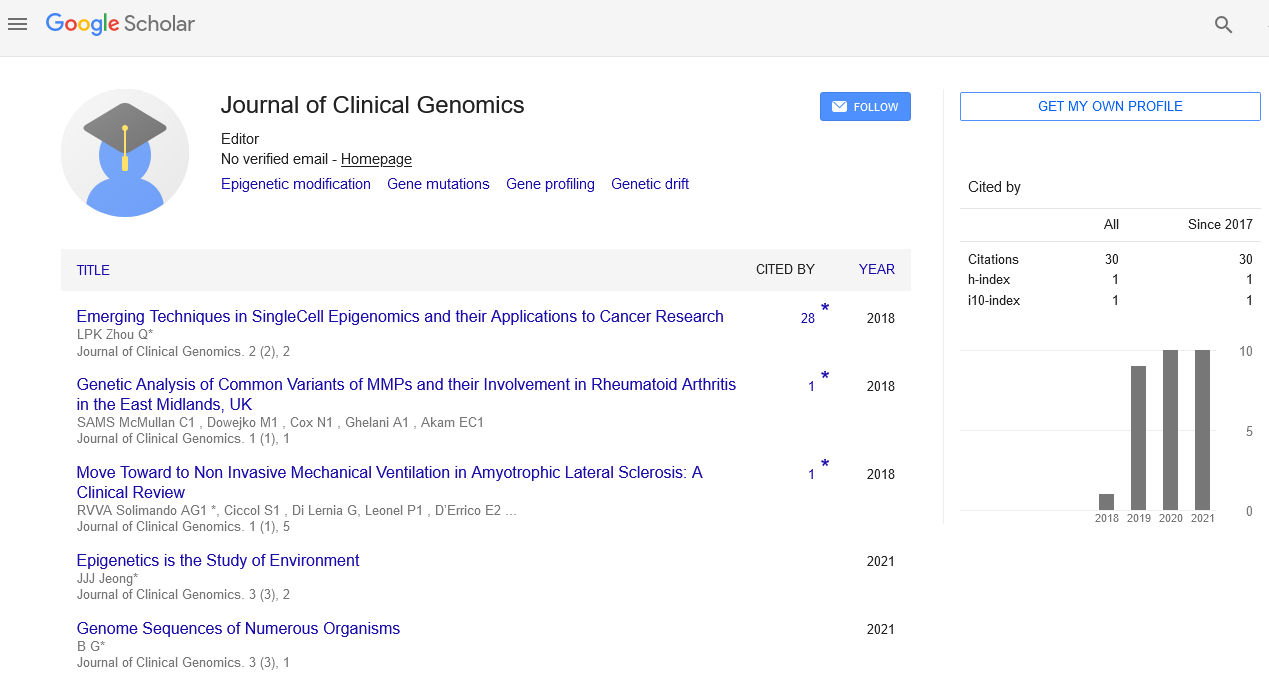Commentary, J Clin Genom Vol: 5 Issue: 2
Role of Gene Mutations in Genetic Disorders from Mendelian to Complex Inheritance
Christi Guerrini*
1Department of Genetics, Griffith University, Brisbane, Australia
*Corresponding Author: Christi Guerrini,
Department of Genetics, Griffith
University, Brisbane, Australia
E-mail: christi@grn.au
Received date: 24 May, 2023, Manuscript No. JCG-23-107416
Editor assigned date: 26 May, 2023, PreQC No. JCG-23-107416 (PQ);
Reviewed date: 12 June, 2023, QC No. JCG-23-107416;
Revised date: 19 June, 2023, Manuscript No. JCG-23-107416 (R);
Published date: 26 June, 2023 DOI: 10.4172/JCG.1000128
Citation: Guerrini C (2023) Role of Gene Mutations in Genetic Disorders from Mendelian to Complex Inheritance. J Clin Genom 5:2.
Description
Genetic disorders are medical conditions caused by abnormalities in the DNA sequence of individual genes. These abnormalities known as gene mutations can disrupt the normal functioning of proteins leading to a wide range of health issues. The understanding of the role of gene mutations in genetic disorders has evolved significantly over the years, from classic Mendelian inheritance patterns to complex interactions involving multiple genes and environmental factors. Mendelian inheritance refers to the classical patterns of inheritance described by Gregor Mendel, involving the transmission of single gene traits from one generation to the next. Gene mutations play an important role in Mendelian genetic disorders. There are three main types of Mendelian inheritance: Autosomal dominant, autosomal recessive, and X-linked inheritance.
Autosomal dominant disorders occur when a single copy of a mutant gene (heterozygous state) is sufficient to cause the disease. In such cases, individuals with one affected allele have a 50% chance of passing the disorder to their offspring. Examples of autosomal dominant disorders include Huntington's disease and Marfan syndrome. Autosomal recessive disorders require both copies of the gene to be mutated (homozygous state) for the condition to manifest. Carriers of one mutant allele (heterozygous carriers) are typically asymptomatic. Offspring of two heterozygous carriers have a 25% chance of inheriting the disorder. Cystic fibrosis and sickle cell anemia are examples of autosomal recessive disorders. X-linked disorders are caused by gene mutations located on the X chromosome. As males have one X-chromosome, they are more susceptible to X-linked disorders. Females, who have two X-chromosomes, may be carriers if they inherit one mutant allele and typically have a milder presentation. Hemophilia and Duchenne muscular dystrophy are examples of Xlinked disorders.
While Mendelian inheritance patterns provide a clear understanding of some genetic disorders, many conditions involve complex interactions between multiple genes and environmental factors. Polygenic inheritance occurs when a trait or disorder is influenced by multiple genes. Each gene contributes a small effect to the overall phenotype. Common examples of polygenic disorders include diabetes, hypertension, and obesity. Identifying specific gene mutations contributing to these disorders presents significant challenges due to the multitude of interacting genes. Multifactorial inheritance involves the combined influence of multiple genes and environmental factors. These disorders are often observed to cluster in families but do not follow a straightforward Mendelian pattern. Congenital heart defects, cleft lip and palate, and neural tube defects are examples of multifactorial disorders.
Epigenetic modifications can influence gene expression without altering the underlying DNA sequence. Changes in DNA methylation, histone modifications, and non-coding RNA expression can lead to the development of genetic disorders. Epigenetic changes can be reversible and influenced by environmental factors, adding complexity to the understanding of disease etiology. The identification of gene mutations responsible for genetic disorders is crucial for accurate diagnosis, risk assessment, and potential treatment strategies. However, several challenges exist in pinpointing the genetic basis of certain disorders, especially those with complex inheritance. Many genetic disorders exhibit genetic heterogeneity, meaning that mutations in different genes can cause similar clinical presentations. This complexity often complicates the diagnostic process, as identifying the precise gene mutation requires extensive genetic testing.
Recent advances in Next-Generation Sequencing (NGS) technologies have revolutionized genetic testing. NGS allows researchers and clinicians to analyze multiple genes simultaneously, significantly increasing the efficiency of identifying disease-causing mutations. Whole-exome sequencing and whole-genome sequencing have become invaluable tools in unraveling the genetic basis of both Mendelian and complex genetic disorders. Understanding the role of gene mutations in genetic disorders has significant implications for precision medicine. Precision medicine used for treatment strategies based on an individual's unique genetic makeup, enhancing treatment efficacy and reducing adverse effects.
 Spanish
Spanish  Chinese
Chinese  Russian
Russian  German
German  French
French  Japanese
Japanese  Portuguese
Portuguese  Hindi
Hindi 